September 05, 2019
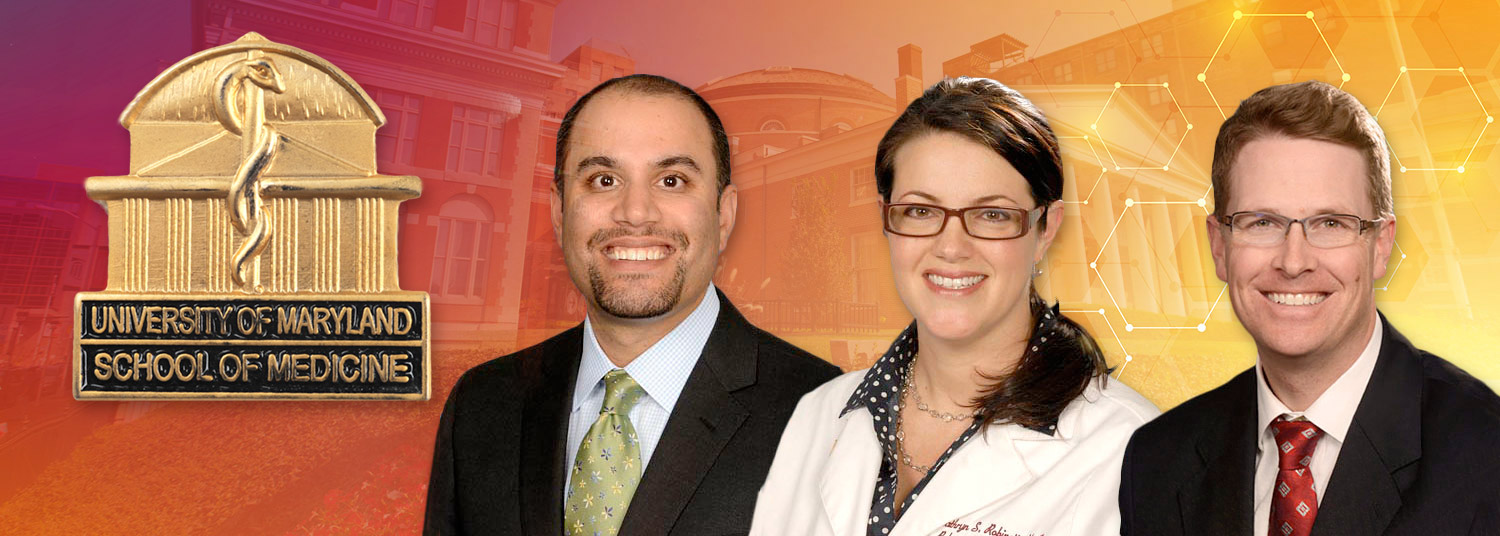
New Leaders Will Provide Added Support for Students in Education, Admissions, and Wellness Initiatives
University of Maryland School of Medicine (UMSOM) Senior Associate Dean for Undergraduate Medical Education and Associate Dean for Student Affairs, Donna Parker, MD, FACP, along with James Kaper, PhD, Vice Dean for Academic Affairs, and UMSOM Dean E. Albert Reece, MD, PhD, MBA, today announced the appointment of new Assistant Deans in Medical Education, Student Affairs, and Admissions.
Nirav Shah, MD, Associate Professor in the Department of Medicine, was named Assistant Dean for Curriculum in the Office of Medical Education, a newly created position; Kathryn Robinett, MD, Assistant Professor in the Department of Medicine, was named Assistant Dean of Admissions; and John Allen, MD, Assistant Professor in the Department of Medicine, was named Assistant Dean for Student Affairs. All three began their positions on July 1.
"Our three new Assistant Deans are talented and experienced people who have already demonstrated their commitment to our institution through their hard work and caring interactions with our students,” said Dr. Parker, who is also Associate Professor of Medicine. “I am so grateful to have them newly installed in these leadership positions.”
The new senior leaders will bolster support to students across a range of admissions and education areas and help launch the UMSOM’s innovative new “Renaissance” curriculum, as it rolls out in 2020.
“We are excited to launch our new Renaissance curriculum, which will enable our students to become even more competitive candidates for the best residency programs,” said Dr. Kaper. “Ultimately, our goal is to prepare them for a long and fruitful career as knowledgeable, humanistic physicians and scientists who are leaders in their fields.”
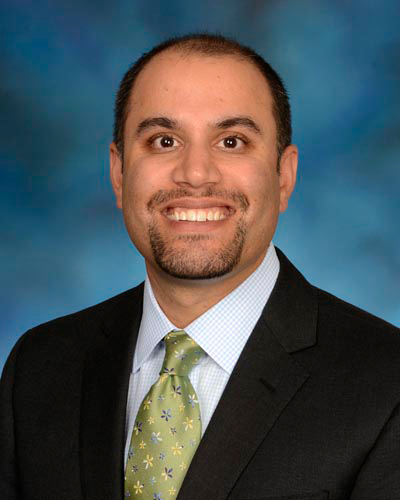 Dr. Shah is New Assistant Dean for Curriculum
Dr. Shah is New Assistant Dean for Curriculum
Dr. Shah’s responsibilities as Assistant Dean for Curriculum include developing and implementing the Renaissance curriculum for MD degree students that will be fully in place by September 2020. The curriculum aims to not only produce excellent clinicians, but also lifelong learners and critical thinkers who are compassionate, possess leadership skills, and care about social justice issues and the need for diversity.
According to Dr. Shah, the new curriculum takes a systems-based approach to learning, combining instruction in both the healthy and disease processes of the body into related organ systems such as heart, lung, and kidneys. Students will learn about healthy states of function, along with various diseases when malfunctions occur, while interacting with patients who have these conditions. Students will also enter the clinical portion of medical school a few months earlier – in March of their second year instead of early summer.
“Getting a few extra months of clinical care is critical in maintaining competitiveness for residency applications which will ultimately result in our students matching into top-tier residencies,” Dr. Shah said.
As part of his duties, Dr. Shah will recruit and supervise a team of highly qualified instructors to teach these systems-based courses. He will also help expand the pre-intern “boot camps” to teach specific skills that graduating medical students will need to succeed in their upcoming internships. He will also serve as a mentor for junior faculty and ensure that the UMSOM curriculum meets accreditation standards while integrating diversity and cultural awareness.
Dr. Shah received his MD degree from St. George's University School of Medicine in Grenada, West Indies. Upon graduating from St. George's University with Honors, he did his internship and residency in Internal Medicine at the Georgetown University Hospital/Washington Hospital Center Program in Washington, D.C. He completed his fellowship in Critical Care Medicine at the National Institutes of Health and his fellowship in Pulmonary Diseases at the University of Maryland Medical Center. Dr. Shah is board certified in Pulmonary Diseases and Critical Care Medicine.
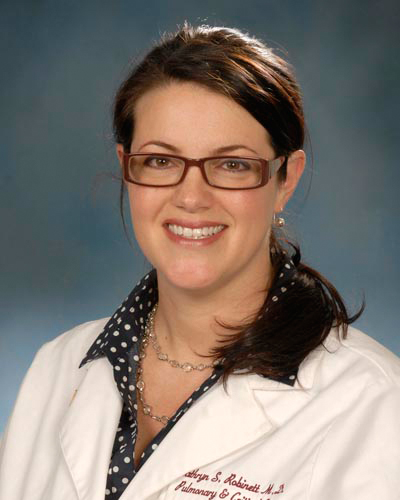 Dr. Robinett is New Assistant Dean for Admissions
Dr. Robinett is New Assistant Dean for Admissions
As Assistant Dean for Admissions, Dr. Robinett succeeds Sandra Quezada, MD, Associate Professor in the Department of Medicine, who was recently promoted to Associate Dean for Medical School Admissions. Dr. Robinett has taken on the responsibility of helping the busy Admissions office recruit and matriculate those individuals who will fit seamlessly into the Renaissance curriculum–those who excel in systems-based thinking with a strong sense of mission to help patients lead healthier lives. She will look to identify students who have shown a strong commitment to scientific research and service along with a willingness to continue these passions even after taking on the demands of medical school coursework. Dr. Robinett also hopes to continue expanding and improving programs to grow and enhance the diversity of the student body. She is also involved with Graduate Medical Education as the Associate Program Director for the Pulmonary and Critical Care Fellowship.
After completing her MD degree at the UMSOM, Dr. Robinett completed an internship and residency in Internal Medicine at the University of North Carolina, Chapel Hill, and then returned to UMSOM for fellowship training in Pulmonary and Critical Care Medicine. Once her fellowship was completed, she remained as a faculty member, focusing on severe asthma for her clinical care and research. Specifically, she has been involved with the discovery of bitter taste receptors on the human airway smooth muscle and the role they could play in the treatment of asthma and chronic obstructive lung disease (COPD).
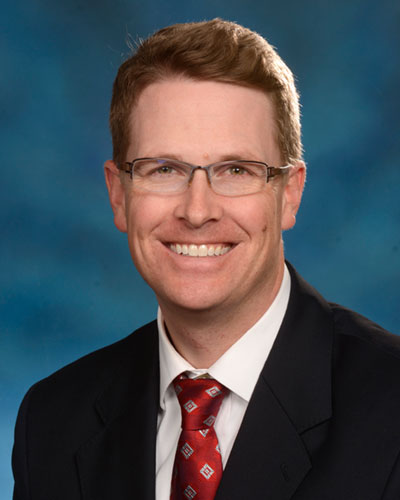 Dr. Allen is New Assistant Dean for Student Affairs
Dr. Allen is New Assistant Dean for Student Affairs
In his position as Assistant Dean of Student Affairs, Dr. Allen will counsel and mentor medical students, help develop the MD degree student performance evaluations, and guide these students through the Residency Match program. He also has been tasked with expanding programs and resources to improve student wellness as well as broadening the school’s wellness curriculum, which includes a new required course in culinary arts and nutrition. He will also help to increase student service activities like volunteering at Healthcare for the Homeless tobuild stronger connections with the Baltimore community. In addition, he will assist the office in monitoring student registration, student progress and advancement, graduation, and all aspects of student life related to medical education. With the dedicated and robust implementation of student wellness activities through Wellness and Resilience Initiatives and House Mentoring program, the Office of Student Affairs aims to reduce levels of burnout during medical school by teaching students place a premium on self-care.
Dr. Allen joined the faculty at the University of Maryland School of Medicine in July 2018 and works as a primary care physician at the Faculty Practice Office, sees inpatients for general internal medicine, and is attending on the Med 2 service at the University of Maryland Medical Center (UMMC). He is actively involved in medical student and resident education, and serves as a core faculty member for the Internal Medicine Residency Program. He graduated with his MD degree from the UMSOM and competed his residency in Internal Medicine at UMMC. Prior to that, he received his B.S. degree in Political Science from Washington University in St. Louis and pursued his post-baccalaureate training at UM, College Park.
“This has been a tremendous collaborative effort, as we lay the groundwork for educating the next generation of physicians and scientists,” said Dean Reece, who is also Executive Vice President for Medical Affairs, UM Baltimore, and the John Z. and Akiko K. Bowers Distinguished Professor. “We now have the senior leaders in place to help us prepare our students to become lifelong learners who are clinically excellent and possess humanism, professionalism, scholarship, leadership and critical thinking skills.”
About the University of Maryland School of Medicine
Now in its third century, the University of Maryland School of Medicine was chartered in 1807 as the first public medical school in the United States. It continues today as one of the fastest growing, top-tier biomedical research enterprises in the world, with 43 academic departments, centers, institutes, and programs. The School of Medicine has a faculty of more than 3,000 physicians, scientists, and allied health professionals, including members of the National Academy of Medicine and the National Academy of Sciences, and a distinguished recipient of the Albert E. Lasker Award in Medical Research. With an operating budget of more than $1.2 billion, the School of Medicine works closely in partnership with the University of Maryland Medical Center and Medical System to provide research-intensive, academic and clinically based care for more than 1.2 million patients each year. The School has over 2,500 students, residents, and fellows, and more than $540 million in extramural funding, with most of its academic departments highly ranked among all medical schools in the nation in research funding. As one of the seven professional schools that make up the University of Maryland, Baltimore campus, the School of Medicine has a total workforce of nearly 7,000 individuals. The combined School and Medical System (“University of Maryland Medicine”) has an annual budget of over $6 billion and an economic impact of more than $15 billion on the state and local community. The School of Medicine faculty, which ranks as the 8th highest among public medical schools in research productivity, is an innovator in translational medicine, with 600 active patents and 24 start-up companies. The School works locally, nationally, and globally, with research and treatment facilities in 36 countries around the world. Visit medschool.umaryland.edu
Contact
Office of Public Affairs
655 West Baltimore Street
Bressler Research Building 14-002
Baltimore, Maryland 21201-1559
Contact Media Relations
(410) 706-5260
Related stories
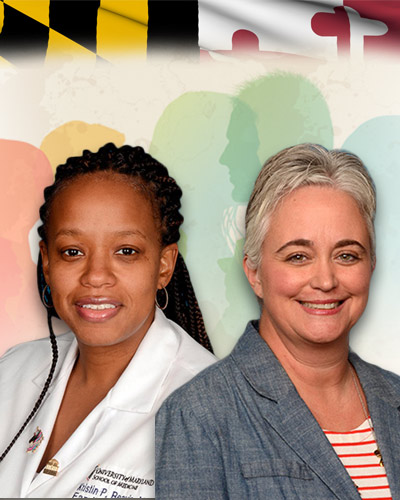
Wednesday, February 26, 2020
UMSOM’s Office of Student Affairs Names Dr. Kristin Reavis as Director of Student Diversity and Inclusion, and Dr. Constance Lacap as Assistant Dean for Assessment
University of Maryland School of Medicine (UMSOM) Senior Associate Dean for Undergraduate Medical Education, Donna Parker, MD, FACP, along with Dean E. Albert Reece, MD, PhD, MBA, today announced two appointments that will further enhance the quality of medical education at the UMSOM. Kristin Reavis, MD, Assistant Professor of Family and Community Medicine, has been named Director of Student Diversity and Inclusion in the Office of Student Affairs, while Constance N. Lacap, DO, Assistant Professor of Psychiatry, has been named Assistant Dean for Assessment in the Office of Medical Education.
